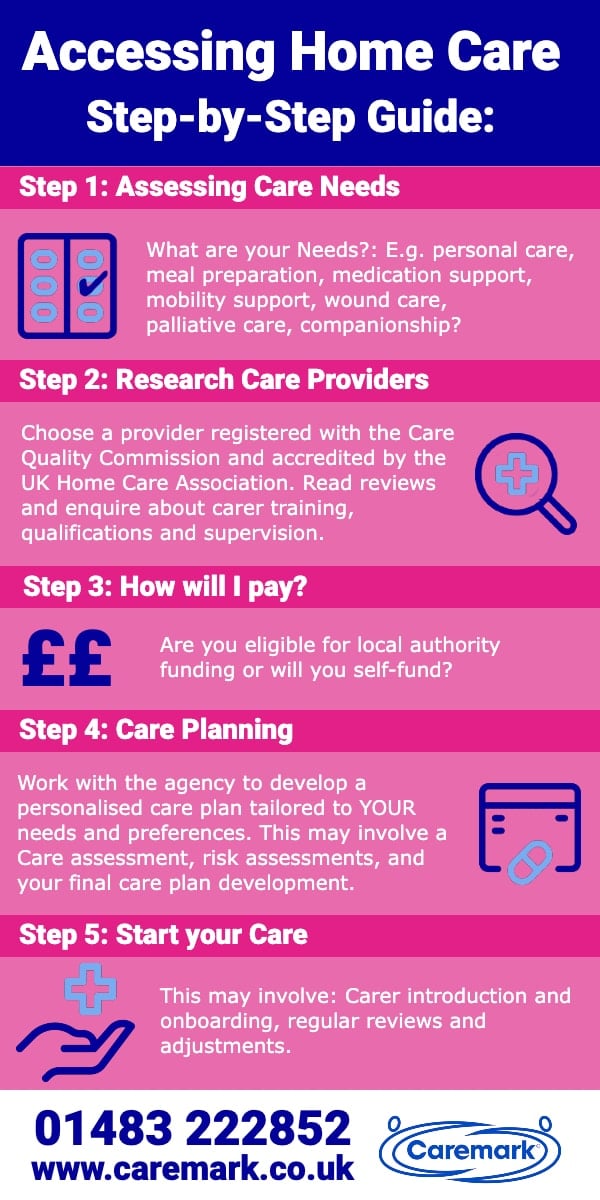A Step-by-Step Guide to Accessing home care services

For individuals in need of support with daily activities or healthcare needs, home care offers a flexible and personalised solution to maintain independence and quality of life in the comfort of their own homes. However, navigating the process of accessing home care can be overwhelming without a clear understanding of the steps involved.
In this article, we’ll provide a comprehensive step-by-step guide to getting home care, covering key considerations, available support options, and practical tips for a smooth and successful transition to home care services.
Step 1: Assessing Care Needs
The first step in accessing home care is to assess the individual’s care needs thoroughly. This assessment can be conducted by a healthcare professional, social worker, or care manager and may involve:
- Identifying activities of daily living requiring assistance, such as personal care, meal preparation, medication management, and mobility support.
Evaluating specific healthcare needs, including managing chronic conditions, wound care, post-operative support, or palliative care.- Assessing cognitive, emotional, and social needs, such as companionship, cognitive stimulation, or emotional support.
Step 2: Researching Home Care Providers
Once care needs have been assessed, research home care providers in your local area to find a suitable match for the individual’s needs and preferences. Considerations when researching home care providers include:
- Reputation and accreditation: Look for home care agencies registered with the Care Quality Commission (CQC) and accredited by professional bodies such as the UK Home Care Association (UKHCA).
- Services offered: Evaluate the range of services offered by home care providers, including personal care, home help, companionship, nursing care, specialist dementia care, and end-of-life care.
- Staff qualifications and training: Inquire about the qualifications, training, and experience of care staff employed by the agency, including healthcare assistants, nurses, and specialised caregivers.
- Client testimonials and reviews: Seek feedback from current or past clients of home care providers to gauge their satisfaction with the quality of care and support received.
Step 3: Financial Assessment and Funding Options
Before arranging home care services, you may need to undergo a financial assessment to determine eligibility for financial assistance or funding. This assessment will consider factors such as income, savings, assets, and care needs to determine whether you qualify for financial support from the local authority or other sources. Funding options for home care may include:
- Local authority funding: If eligible, the local authority may provide funding or subsidies for home care services based on assessed care needs and financial circumstances.
- Personal budgets: Individuals assessed as eligible for social care support may receive a personal budget to purchase home care services of their choice, giving them greater control and flexibility over their care arrangements.
- Self-funding: If not eligible for financial assistance, individuals may choose to self-fund home care services using personal savings, assets, or income.

Step 4: Care Planning and Coordination
Once a home care provider has been selected, work with the agency to develop a personalised care plan tailored to the individual’s needs and preferences. This may involve:
- Care assessment: Conduct a comprehensive care assessment with the home care provider to identify specific care requirements, preferences, and goals.
- Care plan development: Collaborate with the care manager or coordinator to develop a detailed care plan outlining the type and frequency of care services required, caregiver assignments, and emergency protocols.
- Coordination with healthcare professionals: Communicate with the individual’s healthcare team, including GPs, district nurses, therapists, and specialists, to ensure seamless coordination of medical and care services.
Step 5: Implementing Home Care Services
With the care plan in place, home care services can be implemented according to the individual’s needs and preferences. This may involve:
- Caregiver introduction: Arrange for an introductory meeting between the individual and their assigned caregivers to facilitate rapport-building, establish trust, and familiarise the caregiver with the individual’s routines, preferences, and care requirements.
- Caregiver training and supervision: Ensure caregivers receive adequate training, supervision, and support from the home care agency to deliver safe, compassionate, and high-quality care services.
- Regular reviews and adjustments: Schedule regular reviews and evaluations of home care services to assess their effectiveness, address any concerns or issues, and make adjustments to the care plan as needed.
Step 6: Monitoring and Reviewing Care Services
Once home care services are underway, monitor and review the quality and effectiveness of care regularly to ensure the individual’s needs are being met and their well-being is maintained. This may involve:
- Regular check-ins: Maintain open communication with the home care provider and individual receiving care to address any questions, concerns, or feedback promptly.
- Care reviews: Schedule periodic care reviews with the home care agency to evaluate the individual’s progress, review care goals, and make adjustments to the care plan as necessary.
- Quality assurance: Seek feedback from the individual, family members, and healthcare professionals involved in their care to assess the quality of care services and identify areas for improvement.
Accessing home care services involves several steps, from assessing care needs and researching providers to coordinating care plans and implementing services effectively. By following a structured approach and seeking guidance from healthcare professionals and social care providers, individuals and their families can navigate the process with confidence and access the support they need to maintain independence, dignity, and quality of life in their own homes.
Find out more about the CQC here
Find out more about Home Care Association here
Elderly care Guildford. Elderly care Woking.